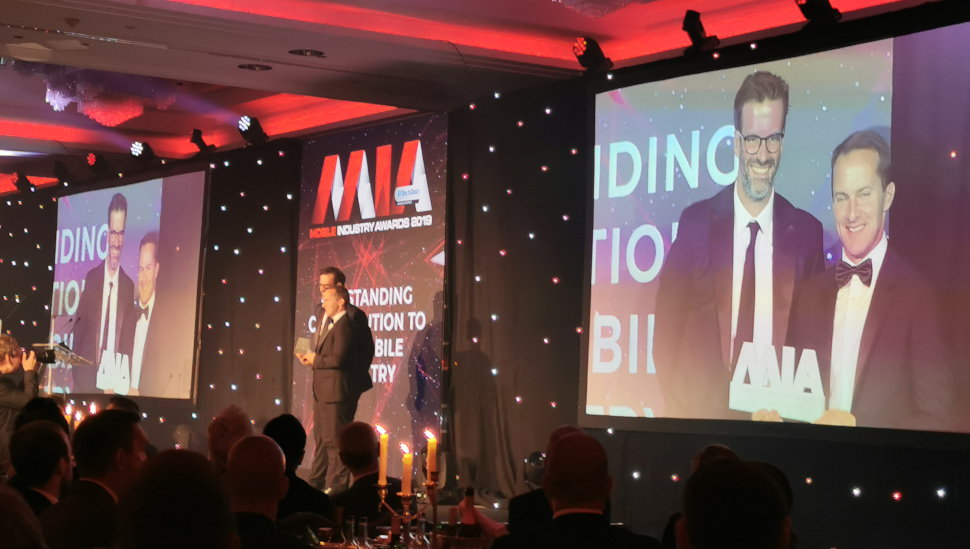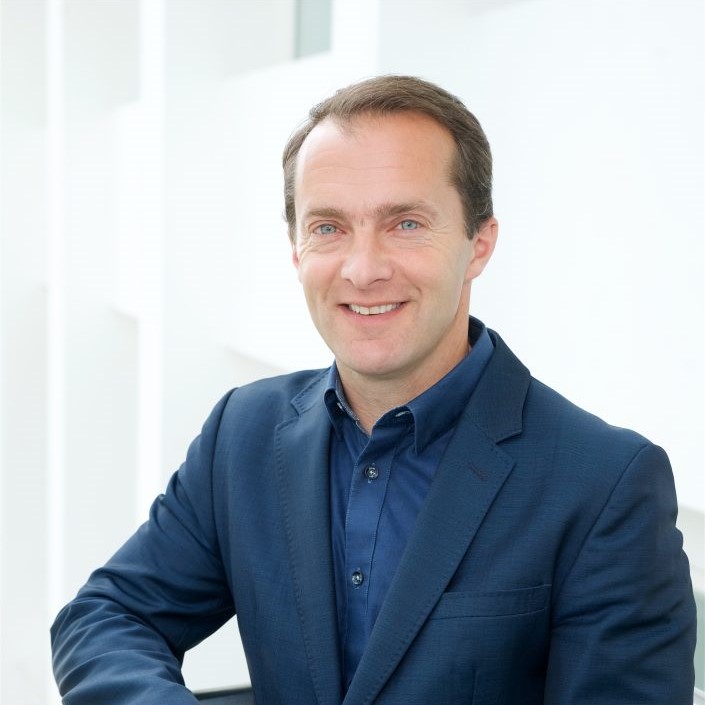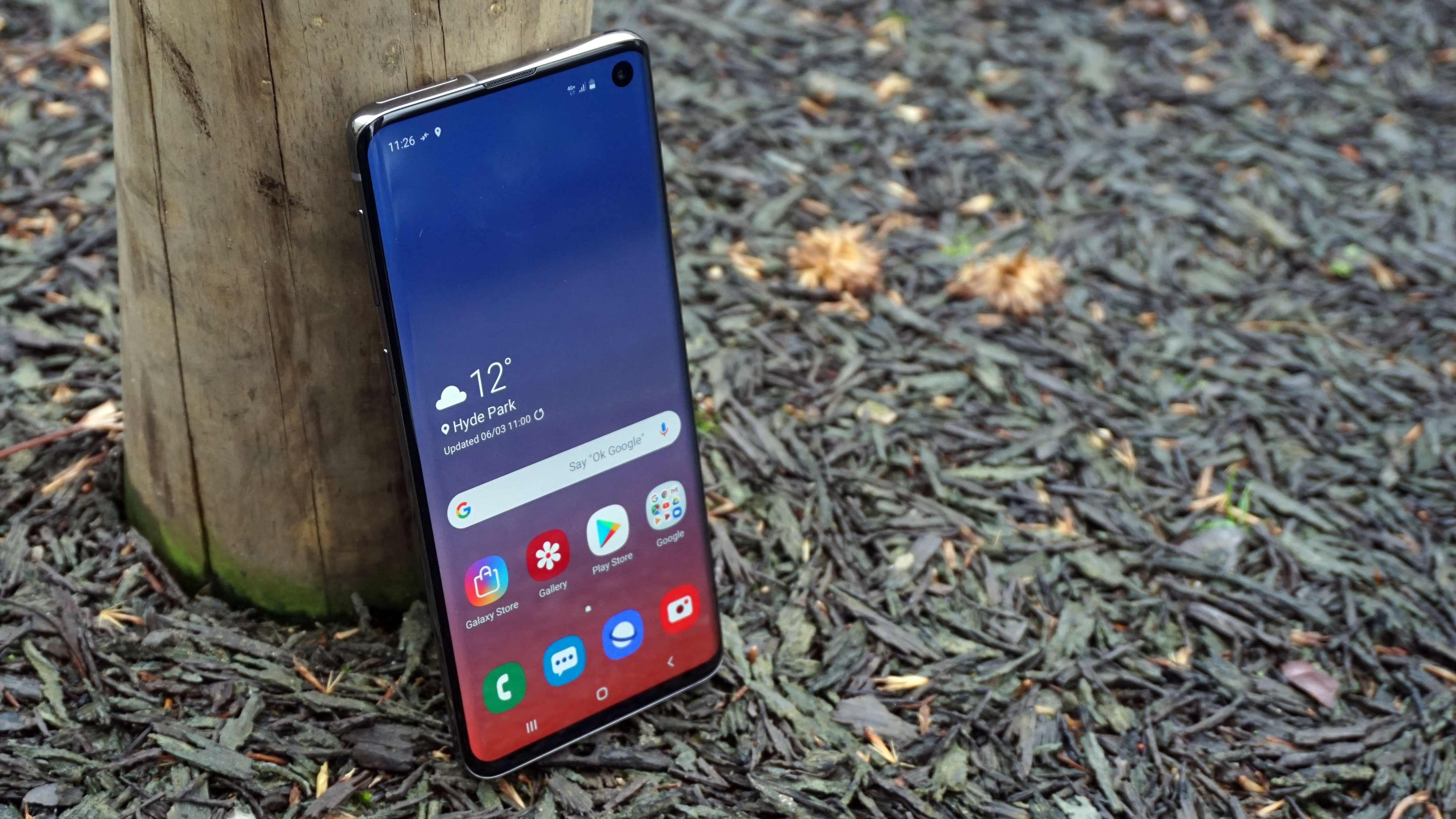Samsung's Conor Pierce wins MIA 2019 Outstanding Contribution to the Mobile Industry award
'I wouldn't have achieved this without our team', he tells us

“I’ve trained myself,” he says. “My phone is never in my bedroom [at home] and when my device isn’t buzzing
It might be surprising for a man who commands such influence in the mobile market, but Samsung’s UK chief Conor Pierce prefers more traditional forms of communication.
He says he only sends about ten emails a week and deals with people either in person or on the phone. If anyone needs to contact him, they know they can ring or WhatsApp him and he’ll ring them back.
He has disabled all other notifications off on his smartphone and has hidden most applications. To prove it, he shows TechRadar Pro a virtually blank home screen - aside from a picture of his dog. It’s not that he doesn’t value the capabilities of his company’s smartphones, it’s just the way he likes to do business.
The importance of teamwork
It’s clear that in our meeting at Samsung’s head office in leafy Chertsey that happiness is important to Pierce and his leadership style. He values teamwork, customer experience, and the ability to separate personal and professional lives into separate spheres.
He has many interests outside the industry, has travelled the world, and even swam at a national level in his native Ireland. Now, after years of globetrotting, Pierce splits his time between the UK and his family home in South Dublin. He is proof that it’s possible to have a life outside of work and still be successful.
The past 12 months have provided more evidence. Pierce oversaw a successful UK launch of the Samsung Galaxy S10 and was promoted to Corporate Vice President at the company. This is a significant promotion given the importance that Samsung places on the “lighthouse” UK market and gives Pierce a stronger voice within the Korean electronics giant.
Are you a pro? Subscribe to our newsletter
Sign up to the TechRadar Pro newsletter to get all the top news, opinion, features and guidance your business needs to succeed!
Over the past few years, Pierce is credited with helping grow sales and profitability with Samsung’s UK mobile business despite challenging market conditions. Samsung says the fact that Pierce was the only promotion to Corporate Vice President in its global IT and mobile division is testament to his achievements.
And this performance is a huge factor in why Pierce has won the inaugural Outstanding Contribution to the Mobile Industry award at the 2019 Mobile Industry Awards (MIA). But the accolade also reflects a career that has spanned more than two decades.

Individual pursuits
Pierce was one of six children, born in Shankill, Co Dublin, in 1970. He attended the prestigious Blackrock College – famous for its rugby team and for nurturing former Ireland captain Brian O’Driscoll among others – but for all his fondness of teamwork now, he had little interest in team sports.
Aged nine, Pierce was diagnosed with a form of juvenile arthritis called Still’s disease that limited his movement, and, in any case, he was “incredibly shy”. This was why he devoted himself to individual pursuits.
“It’s different these days, but [at the time], if you weren’t playing rugby then they weren’t really at Blackrock College,” he explains. “Just like Forrest Gump didn’t stop running, I just didn’t stop swimming and I got to a national level. Only at 15 or 16 I did realise there was more to life than swimming.”
Pierce studied for a Bachelor of Commerce degree at University College Dublin (UCD) before delaying his master’s degree to go travelling. He would receive a letter from his father in every city he visited, urging him to complete his studies, something he duly did before embarking on another backpacking tour (this time he went the other way around the world).

Life lessons
Pierce returned to a difficult job market in the mid-1990s and took a job selling insurance to primary school teachers in the west of Ireland. This involved low base pay and a lot of travelling but the sales techniques he had been taught failed to yield a single sale.
Recognising that rural Ireland required a different approach to the city, Pierce ditched the suit and told prospective clients to come and have a chat if they were interested. Eventually, he attracted interest and made multiple sales thanks to word of mouth recommendations.
This was followed by a spell at his father’s sock company. Pierce was ordered to spend time around the factory, sweeping the floor and performing other tasks.
His early career taught Pierce of the value of learning about customers and gaining their trust, as well as the importance of learning everything there is to learn about a business and acquiring the respect of a team. These lessons would prove invaluable as Pierce began his career in the mobile industry.

Connecting people
He started out as General Manager of consumer products at Ericsson in Ireland in 1996, helping to oversee the transition from Ericsson to Sony Ericsson, before shifting to an operator focused role. In 2004 he became the head of Nokia Ireland before making the move to Dubai to become the Head of Go to Market for the Middle East and Africa in 2008.
Although Pierce relished the experience of handling sales teams and internal stakeholders, he missed “life in the trenches” and became the Managing Director for Nokia Turkey in 2009. It was in Istanbul that Pierce enjoyed some of the most rewarding moments of his career.
“I wasn’t so naïve, but the challenge was so raw. Turkey is a kaleidoscope [of challenges],” he says, citing the various demographic, geographical and cultural differences between the country and other markets.
“In my first week, I was summoned to Ankara by the foreign minister. He told me that Nokia is the strongest brand in Turkey, but that we didn’t do any manufacturing there and he thought we should. He told me ‘the sooner you do, the more success you will have’. A few weeks later, they blocked the border and stopped us until we started making some investment.”
Pierce learnt the language (he reckons he’s about 85 per cent fluent) and embraced the culture. To this day, he still keeps a Turkish coffee pot in his office.
“There was a lot of great talent there but had become disillusioned. And then some crazy Irishman comes in! It was my first turnaround opportunity. Engagement isn’t just a word, its about getting people to believe in what you’re doing.
“All I cared about was that the team would thrive after I left. I’m not looking for praise, I’m just doing my job and you need to have a strong succession plan.”
Difficult times
If Turkey was one of the proudest moments of Pierce’s career, then his tenure as vice president of Nokia UK and Ireland would be among the most difficult. It was early 2011 and Nokia’s grip on the market was loosening thanks to the popularity of the iPhone and Android handsets.
Pierce describes a fateful meeting in Windsor where it was decided to ditch Symbian and embrace Windows Phone. The majority of Nokia’s British workforce were Symbian engineers, which meant significant job cuts.
“We were all emotional, because it was the beginning of the end and the start of something new. [When we went to our hotel rooms] there was a note from [then-Nokia CEO] Stephen Elop and a Windows Phone – but it was a Samsung phone! My first Windows Phone and the first phone I received at Nokia was a Samsung!
“It was the biggest challenge of my career, unbuilding the past and building something new under the Microsoft brand.”
Nokia enjoyed some success in the UK market, helping to establish Windows Phone as an alternative to the Apple-Google duopoly. However, Nokia’s Devices and Services unit was later sold to Microsoft and eventually wound down by future CEO Satya Nadella who had little enthusiasm for the business.
With the benefit of hindsight, could Pierce have foreseen Nokia’s demise?
“It was hard for me at the time because I was so emotionally attached to the brand,” he says. “We [at Nokia] were wrapping ourselves up in knots and internalising.
“There was a bit of complacency, such as building Ovi and doing things ourselves rather than looking at partnerships. Nokia was so distant from the consumer, focussing on releasing products rather than listening to the market. There were too many restructures and a lack of clarity.”

Opportunity knocks
But Samsung was impressed by Pierce’s reputation as a turnaround specialist and he jumped at the chance to join the market leader.
“When I came to Samsung in 2015, we had a very different operation to what we have now,” he reflects. “It was volume-led and it was a good time to join and there was a chance to build something. In the past four years I’ve turned this business around and set a clear direction. I’m happy with the team, working with partners to see how we can help them in the long term.
“The UK market is incredibly saturated and competitive so you can’t continue to do the same thing. One of the reasons I wanted to join Samsung was the breadth of the portfolio. I want to connect the world – and it will happen.
“One of the biggest things [I’ve learned] at Samsung is that you can’t fault their ambition and their pace. They empower you to make that change.
“Having been through 2G, 3G and 4G, I’m so excited about 5G. I have to bite my lip a little bit because it will take a long time to deliver everything, but 5G will support us in how we live our lives. There’s no latency, you can connect multiple devices and [connectivity] becomes seamless. It’s a platform that will turn devices into the slave and us as the master.”
Pierce foresees a future with multiple devices and multiple inputs, such as voice, that will allow us to spend less time looking at a screen. This, he hopes, will allow people to spend more time getting on with their lives rather than looking up at a phone screen.
“We’ll have a lot more oxygen to live our normal lives. When I see people glued to their phones, it saddens me.”
'Genuinely humbled'
For all his personal achievements, Pierce stresses that winning the Outstanding Contribution to the Mobile Industry award is a reflection on his team not just himself.
“I’m genuinely humbled, [especially] when you consider all the people in this business” he says. “I wouldn’t have achieved this without our team and the breadth of our partnerships. I pass credit onto our team and I clear the way for them to become brilliant leaders themselves.”
In a few weeks, Pierce will be taking a team of 12 staff up Mont Blanc to raise money for the Lily Foundation after receiving more than 50 applications. He was eager to ensure people “from all walks of life” would apply and simply asked anyone why they wanted to participate.
“We did the Five Peaks challenge last year and we’re now friends for life,” he explains.
Pierce has also raised money for homeless in Dublin and for the Acquired Brain Injury charity in Ireland. It’s a cause close to his heart after his youngest brother died from such an injury in 2005.
“It’s been about self-awareness and doing something good,” he says.
It’s no surprise to learn then that if he wasn’t working in the mobile industry, he’d want to be helping people.
“I would like to be a paramedic in a sea helicopter on the west of Ireland,” he says. “I’ve actually been looking into it.”
And after a career in which he’s prided himself on building strong teams, he’s even managed to develop a liking of rugby that eluded him in his youth.
“When I’m not supporting this team, it’s Leinster,” he says.
- For more information about the Mobile Industry Awards, visit our site!
Steve McCaskill is TechRadar Pro's resident mobile industry expert, covering all aspects of the UK and global news, from operators to service providers and everything in between. He is a former editor of Silicon UK and journalist with over a decade's experience in the technology industry, writing about technology, in particular, telecoms, mobile and sports tech, sports, video games and media.